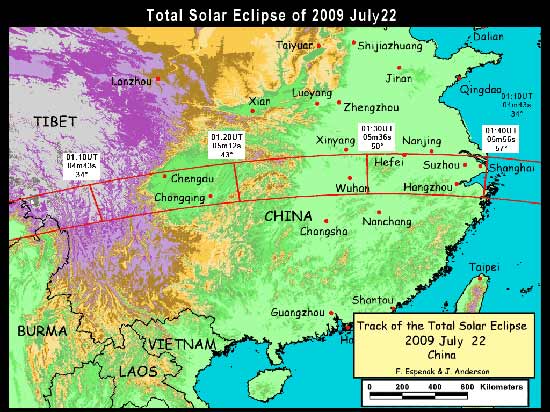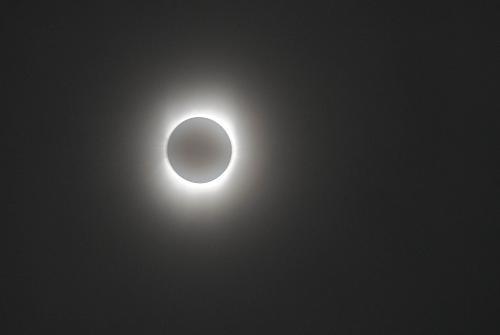By China.org.cn Multimedia Team
A total solar eclipse brought darkness to many places along the upper reaches of China's longest river, the Yangtze, at 9:15 a.m. Wednesday.
The moon's shadow blocked out the sun, leaving only the solar corona visible in west China's Chongqing Municipality and Guang'an City in neighboring Sichuan Province.

 |
|
Solar corona in observation site in west China's Chongqing Municipality.
|
The cities turned off many street lights to allow the public to better observe the total eclipse, which lasted about four minutes.
The July 22 eclipse is the longest total solar eclipse of the 21st Century. It is expected to pass across China from Tibet to the coastal city of Shanghai, where 300 million people live.
Millions of eclipse watchers thronged to the banks of the Yellow and Yangtze rivers early Wednesday to observe the spectacle.
A partial solar eclipse started at 8:01:27 a.m. in Cona County, Tibet in southwest China, according to an observatory of the Chinese Academy of Sciences (CAS).
The county was one of the first places in the country to see the eclipse.
However, the view at Cona was blocked by clouds, according to sources from the CAS Purple Mountain Observatory based in Nanjing, eastern Jiangsu Province.
Cona is 500 km south of Lhasa, Tibet's capital. The sun was covered by clouds in Lhasa as well on Wednesday.
The weather in many Chinese cities along the full solar eclipse path is not favorable for observing the phenomenon, according to the China Meteorological Administration's forecast at 8 a.m.
Zhu Jin, head of the Beijing Astronomical Observatory, said although overcast conditions blocked the view along the lower stream of Yangtze, the shadow of the moon was visible moving behind the clouds.
The full solar blackout could be seen at 9:30 a.m. from an observatory site in Anji, east China's Zhejiang Province, a site chosen by Jay Pasachoff, head of the Solar Eclipse Working Group of the International Astronomical Union (IAU), and some 200 astronomers from more than 20 countries.
"The weather is clear enough to observe the complete duration of the solar eclipse here in Anji. The forecast of the time of the eclipse proved to be accurate," said Zhang Hongqi, chief researcher of the National Astronomical Observatories.
It was raining in Shanghai, when the eclipse occurred at 9:35 a.m. The city put extra police on streets, and more than 30 police vessels patrolled the coast.
Only street lamps were left on, as the city turned off all landscape lighting to allow people to watch the solar eclipse.